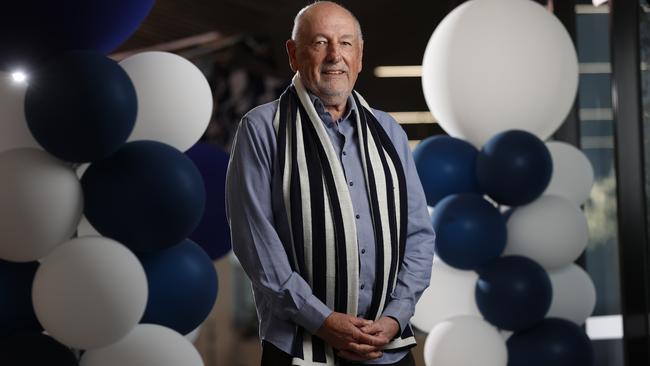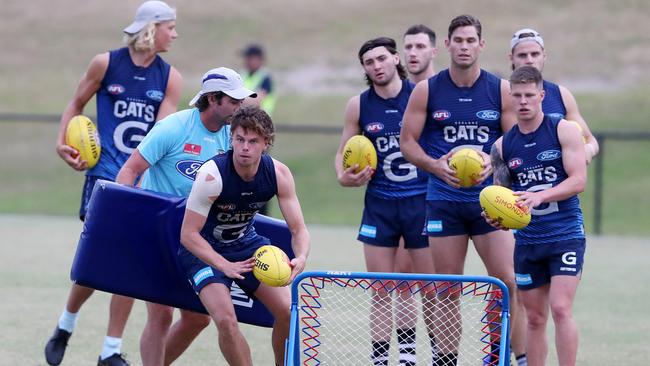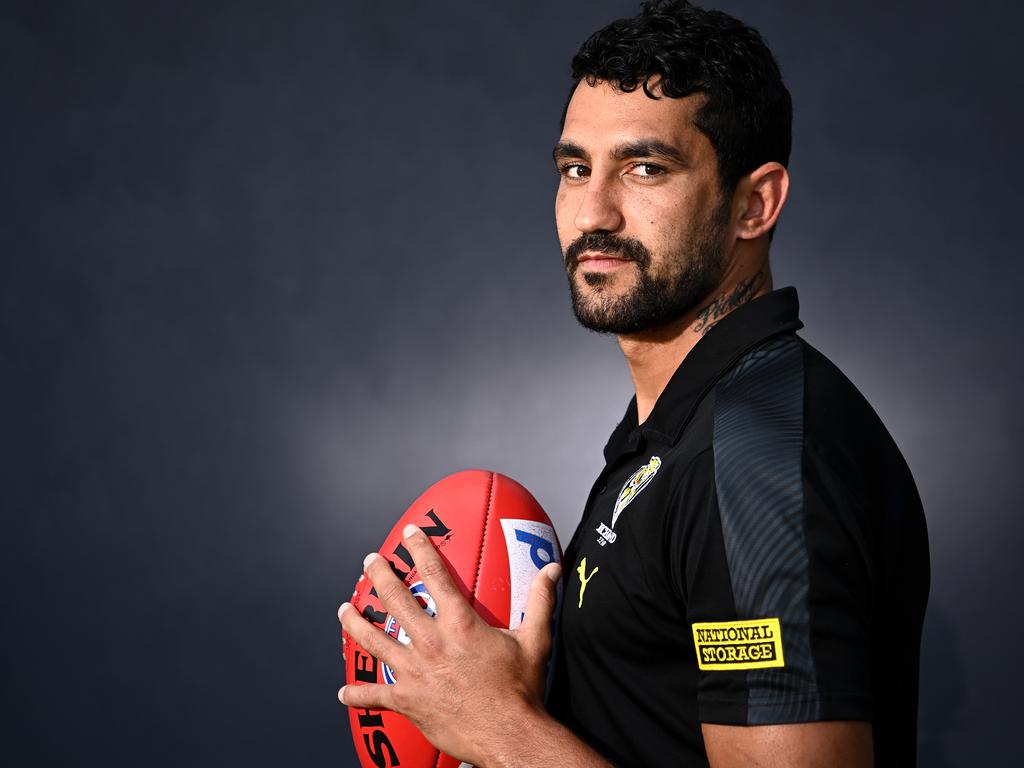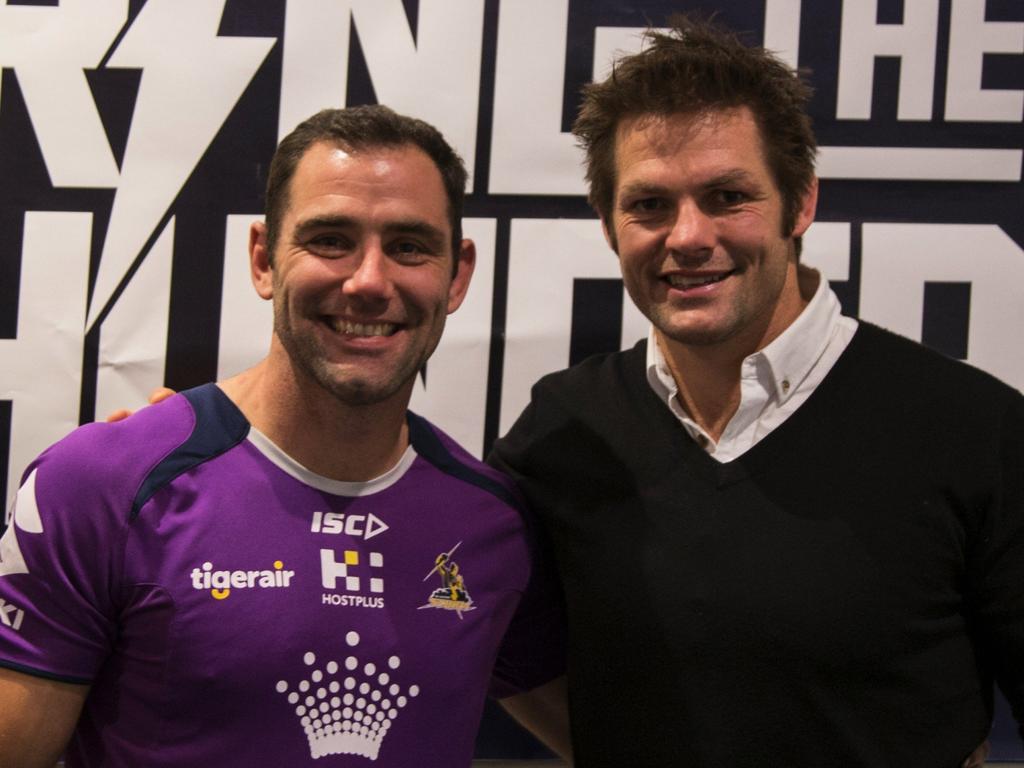Geelong: the ‘Moneyball’ team beating the AFL’s ‘socialist’ equalisation policies
Colin Carter was the architect of the AFL’s laws designed to equalise the competition. His Geelong team is beating the system

It was a bastion of capitalism in Geelong president Colin Carter, a respected Melbourne business figure, who designed the AFL’s “socialist democrat” equalisation system under which player drafts and salary caps were meant to stop teams dominating for years.
Yet Geelong has won the most matches in the AFL in the past 10 years, 20 years and 30 years. It has effectively beaten the system Carter helped construct, based on the US sports “communist” models where most revenue is shared between big clubs and small, when he was a powerful force at AFL headquarters in the 1980s and 90s.
Geelong is a town of only 250,000 people yet its beloved football club keeps beating the teams from the big cities, and will take on defending premier and powerhouse Richmond in the AFL Grand Final in Brisbane on Saturday evening.
It uses a mixture of “Moneyball” principles of finding and trading for undervalued talent from other clubs — Carter is such a fan of the famous Michael Lewis book he bought dozens of copies to hand out when it was published in 2003 — and recruiting players who grew up in the country.
They prefer living in the quiet surfing villages 15 minutes out of town along the Great Ocean Road, like Gary Ablett Jr or Patrick Dangerfield, or in the case of full-forward Tom Hawkins, a farm where he runs 32 angus cows.
“Certainly it has always been a target for those who come from our region, and who might want to come back,” Carter explains of players who are drafted to other teams around the country but tend to find their way back to Geelong. “You’ve got Patrick Dangerfield, who has made the return to Moggs Creek, Luke Dahlhaus came back, Gary [Ablett] came back as well.
“Sometimes I ask players who join from other clubs what word comes to mind … the word they come up with is ‘care’. That is interesting. You might think a player would say a great gym or the surf is good. We are a club that has a reputation for looking after its people very well.”
The attraction of Geelong as a destination likely means players take below-market salary rates to move there, a notion that manifested with the news breaking this week that star GWS Giants forward Jeremy Cameron — the biggest catch of the upcoming off-season — wants to join the club.

“We did notice that, and he comes from the country,” Carter says dryly of the boy from Dartmoor in western Victoria. “There’s a lot to play out on that yet — that’s all I’ll say on that.”
Cameron, a genuine star, would under Geelong policy be paid less than the captain and vice-captain, presumably less than he could command on the open market.
Club vice-president Diana Taylor calls it a “coming home” phenomenon and says the team spends $1m annually on community services and programs, ranging from mental health to helping troubled youth and other philanthropic endeavours, to play a leadership role in the town and its surrounds.
“They say we are a destination club or club of choice; we just call it coming home. Whether the boys, or girls in the future with our AFLW club, are from Geelong or not, there’s an affinity with the way we live here, and the way the community embraces us that is familiar and like home for them.”
Dangerfield, the star midfielder who moved from the Adelaide Crows in 2016, says the football and administration staff from highly regarded chief executive Brian Cook down tend to quietly put the team in with a decent chance to win every season, and helps players adapt when they arrive. “Gaz and I were from the area. Rhys [Stanley] came for different reasons around obviously getting rucking opportunities and that is the same for your Gary Rohans and different players who have come from different environments.”
That is where the “Moneyball” component comes in. Carter says Geelong has not had a draft pick well inside the top 10 since Joel Selwood was taken seventh in 2006. He also describes the club as “middle class” in wealth terms. It drafts judiciously and trades for good players from elsewhere.
Carter, a long-time management consultant, wrote the 1985 paper for the then VFL that led to draft and salary cap strategies designed to keep clubs competitive and solvent. It took the “socialist democrat” style of equalisation from US sports like American football and basketball, he says.
“There is an irony in a communist system coming from the world’s biggest capitalist nation for their sports as compared to the capitalist free-for-all that is European soccer.”
Carter joined the AFL commission in the 1990s and Saturday brings an end to his decade stint as Geelong president.
He therefore appreciates the irony that his club keeps winning, but says at least equalisation means decision-making is more vital than a big cheque book.
“If you make a bad decision with list management, don’t develop payers or appoint bad coaches, those decisions tend to stick around for a long time. If you get eight or nine decisions right out of 10, you’re going to be in with a show.”
He says the best decision Geelong has made was not sacking coach Chris Scott in the past few years, when the team struggled to win finals matches after its 2011 grand final win and a “noisy minority” called for his head.
“It is there in every club. But the minority has gone quiet at the moment and I think his win/loss record speaks for itself. It is a merciless industry, unlike business where you can fudge it and your success or otherwise can be opaque. In footy, it is pretty clear where you sit — there’s no second prize.”
Saturday could bring a fairytale yet though, rewarding the tens of thousands of Geelong fans who won’t make it to Brisbane. As Dangerfield says, football is “something that really unites the city and the surf coast and we would love nothing more than to bring that cup back down the highway where it should be.”
Carter says “we all love fairy tales” and Ablett winning a premiership in his last game would certainly be one.
Ablett, the son of a Geelong legend and all-time great in his own right, is more circumspect. When he returned to Geelong in 2018 after seven seasons at the Gold Coast Suns, “I always said it was about winning a premiership.” He kept going this season because he genuinely thought he could help win the club’s fourth grand final in 13 years: “We get a shot this Saturday.”







To join the conversation, please log in. Don't have an account? Register
Join the conversation, you are commenting as Logout